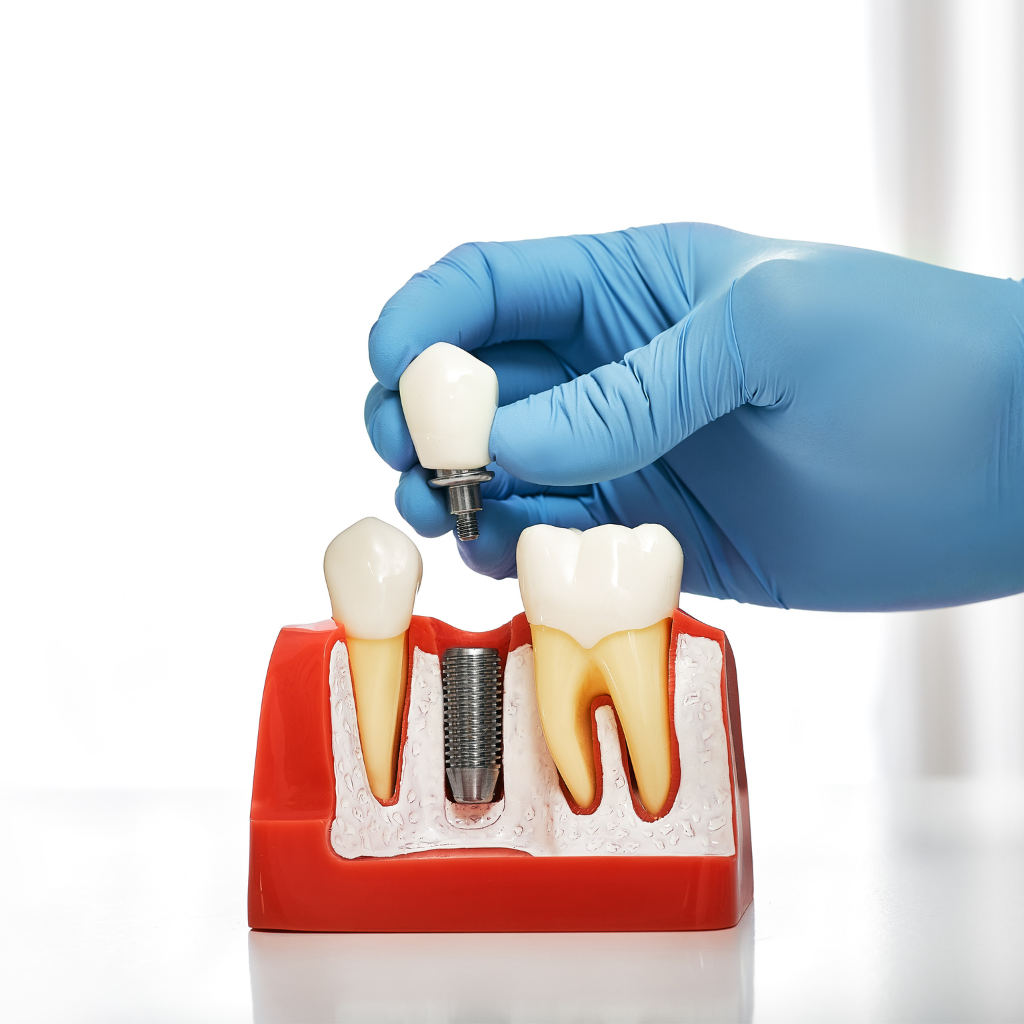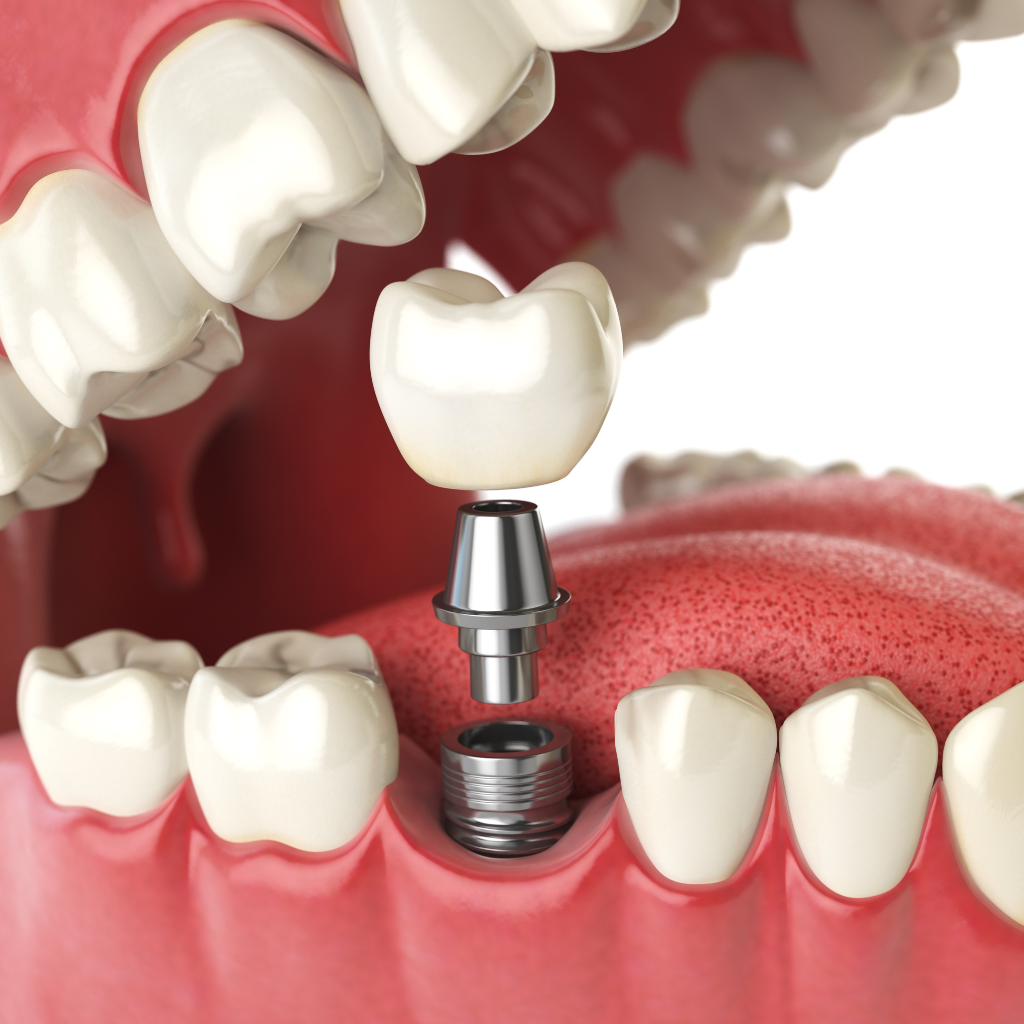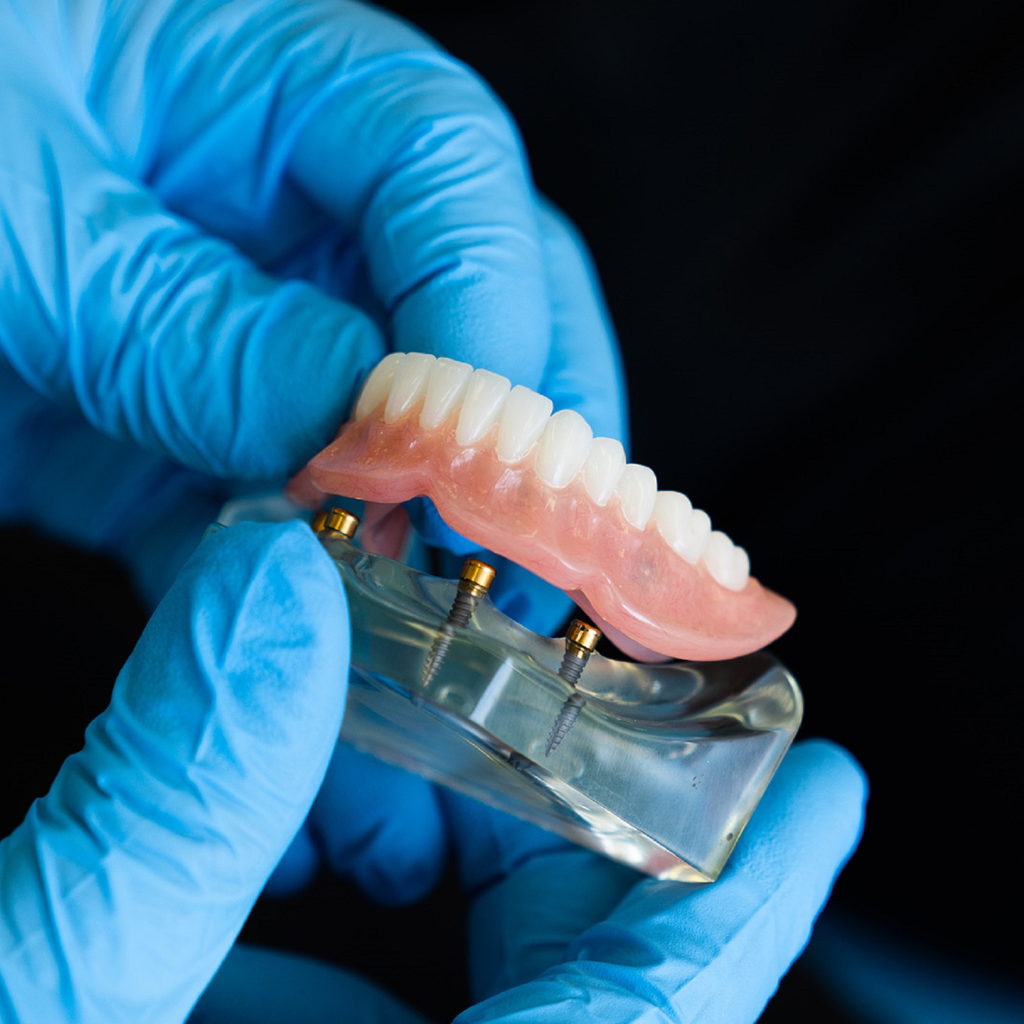Tooth replacement options include dental implants, bridges, and dentures, each with distinct benefits. Implants offer a permanent solution through biocompatible titanium, simulating natural teeth. Bridges serve as fixed solutions for multiple missing teeth by using adjacent teeth. Removable dentures, whether complete or partial, provide cost-effective versatility. Partial dentures attach to natural teeth, enhancing comfort. Overall, tooth replacement enhances oral health, function, and aesthetics, contributing to a perfect smile. To explore these options further, consider the specific needs and individual suitability.
Key Takeaways
- Dental implants offer a permanent, durable solution closely mimicking natural teeth, enhancing both functionality and aesthetics.
- Dental bridges provide a fixed option for multiple missing teeth by using crowns on adjacent teeth for support.
- Complete dentures are cost-effective, removable solutions for those missing all teeth in an arch.
- Partial dentures are less invasive, removable options for individuals with some remaining natural teeth.
- Resin-bonded bridges offer a conservative, minimally invasive alternative for single tooth replacement.
What Are the Main Tooth Replacement Options Available?
To address the challenge of missing teeth, patients have several primary replacement options, including dentures, dental implants, and dental bridges.
Dentures are removable prosthetic devices that rest on the gums and are designed to restore both function and esthetics.
In contrast, dental implants offer a fixed solution by anchoring artificial teeth directly to the jawbone, while dental bridges involve anchoring prosthetic teeth to adjacent natural teeth or implants to fill the gap of missing teeth.
How Do Dentures Work to Replace Missing Teeth
While the loss of natural teeth can greatly impact oral functionality and aesthetics, dentures offer a viable solution by restoring both.
Dentures are prosthetic devices designed to replace missing teeth and are typically categorized as complete or partial. Complete dentures are utilized when all teeth are absent in either the upper or lower dental arch, whereas partial dentures are used when some natural teeth remain.
These removable appliances consist of artificial teeth attached to a supporting structure that fits snugly over the gums. Removable dentures not only improve the ability to chew and speak but also enhance oral health by maintaining facial structure.
A dentist customizes the fit to guarantee comfort and functionality, making dentures an effective option for addressing missing teeth.
Understanding the Benefits of Dental Implants
Dental implants, offering a significant advancement in tooth replacement technology, have become increasingly popular due to their durability and ability to closely mimic natural teeth.
Constructed from biocompatible titanium, these implants serve as a robust solution for tooth loss. When missing a single tooth, a dentist may recommend an implant as a superior choice.
The benefits of dental implants include:
- Osseointegration: The titanium implant fuses with the jawbone, providing stability and preventing bone resorption.
- Functional Equivalence: Implants function like natural teeth, enabling normal chewing and speech without compromising dental health.
- Aesthetic Appeal: Their design closely replicates the appearance of natural teeth, enhancing the patient’s smile.
Dental implants represent a reliable, long-term solution for maintaining oral integrity.

Are Dental Bridges a Good Option
When considering tooth replacement options, one might ask how dental bridges compare to other available methods.
Dental bridges are a viable tooth replacement option, particularly when aiming to replace a single tooth. They involve using dental crowns on adjacent teeth to support the bridge, creating a stable fitting. This method is beneficial for individuals with healthy teeth surrounding the gap, as the crowns help anchor the bridge effectively.
Unlike implants, which require surgical intervention to support the implant, dental bridges offer a less invasive alternative. The materials used in dental bridges are designed to match your natural teeth, ensuring aesthetic consistency.
However, preparation of the surrounding teeth is necessary, which may affect their structure. Overall, dental bridges provide a functional and aesthetically pleasing solution.
How Can I Replace a Single Tooth?
To replace a single tooth, one might consider various options such as a single dental implant, which is often regarded as the most effective solution due to its durability and resemblance to a natural tooth.
Alternatively, dental crowns can be utilized in specific cases to restore functionality and aesthetics, particularly when the root is intact.
For patients seeking non-implant alternatives, fixed dental bridges and removable partial dentures provide viable solutions that cater to different clinical needs and financial considerations.
Is a Single Dental Implant the Best Solution
Dental implants stand as a premier option for replacing a single tooth. They involve an oral surgeon placing a titanium post into the jawbone, mimicking a natural tooth root. Over time, this dental implant integrates with the bone, providing a stable foundation for a crown.
This choice offers several benefits:
- Durability: Implants provide long-term tooth replacement, often lasting decades with proper care.
- Aesthetics: The crown is custom-designed to fit seamlessly with existing teeth, creating a natural appearance.
- Functionality: Replacement teeth on implants function like natural teeth, restoring full bite capability.
Exploring Crowns for Tooth Replacement
While dental implants are a leading choice for single tooth replacement, crowns offer another viable solution for patients seeking to restore dental function and aesthetics.
A crown can effectively replace a severely damaged or decayed tooth by covering it entirely, providing a robust dental restoration. This approach is beneficial in preserving natural teeth, especially when gum disease or tooth decay is localized.
Crowns are an integral part of various types of tooth replacement strategies, offering a less invasive option compared to implants. They are particularly advantageous in situations where the tooth structure is sufficient to support a crown, thereby avoiding extraction.
Ideal oral care is essential to maintain the integrity of the crown and prevent further complications, ensuring long-term dental health.
What Are the Alternatives to a Single Dental Implant
When considering alternatives to a single dental implant, patients have several viable options that cater to different clinical scenarios.
These options for tooth replacement are essential for maintaining oral health and function following the loss of a missing tooth. Here are three primary treatment options:
- Removable Partial Dentures: An economical solution, removable partial dentures offer flexibility and ease of use. They are ideal for patients seeking a non-invasive approach to tooth restoration.
- Tooth-Supported Fixed Bridges: This involves preparing adjacent teeth to support a bridge, effectively filling the gap of the missing tooth. It is a widely accepted method in dental practices today.
- Resin-Bonded Bridges: Particularly suitable for front teeth, these involve minimal tooth alteration and provide a conservative yet effective option to replace a single tooth.

Are Removable Partial Dentures Effective?
Removable partial dentures offer several advantages, such as affordability and ease of maintenance, making them a viable option for many patients seeking tooth replacement.
With regard to comfort, advancements in materials and design have improved their fit and adaptability, although individual comfort levels may vary.
With proper care, the lifespan of removable partial dentures typically ranges from 5 to 10 years, necessitating periodic assessment and adjustment by dental professionals.
What Are the Advantages of Removable Dentures
Despite the myriad of dental restoration options available, removable dentures remain a viable choice due to their versatility and cost-effectiveness.
These prosthetics serve as an effective tooth replacement solution for individuals with missing teeth, offering numerous advantages over alternatives like dental implants.
- Preservation of Adjacent Teeth: Unlike fixed restorations, removable dentures do not require alteration of natural teeth, thereby maintaining their integrity.
- Ease of Maintenance: Removable dentures facilitate oral hygiene practices, as they can be easily taken out for cleaning, reducing plaque buildup and promoting gum health.
- Accessibility and Affordability: Cost-effective compared to other options, removable dentures provide a practical path to achieving a perfect smile without a significant financial burden.
Regular dental visits are essential to guarantee proper fit and function, enhancing the lifespan of these false teeth.
Considering the Comfort of Partial Dentures
Partial dentures offer a viable tooth replacement solution for patients missing one or more teeth in the upper or lower arch. These prosthetics enhance comfort by attaching to natural teeth, providing stability and ease of use.
Compared to other options available, such as dental implants, partial dentures are less invasive and more cost-effective, especially for individuals with multiple missing teeth. Their design aims to balance oral functionality and aesthetics, minimizing the impact on oral health.
While dental implants offer a more permanent solution, partial dentures remain a preferred choice for many due to their adaptability and ease of adjustment.
Ultimately, they contribute to improved oral health by maintaining alignment and preventing additional dental issues.
How Long Do Removable Partial Dentures Last
The longevity of removable partial dentures depends on several factors, including material quality, oral hygiene practices, and regular dental check-ups.
These tooth replacement options are available for those experiencing tooth loss and provide a solution for replacing a missing tooth. Typically, removable partial dentures last between 5 to 10 years, contingent upon:
- Material Durability: High-quality materials enhance longevity, ensuring the dentures are held in place effectively during daily activities without worrying.
- Patient Compliance: Diligent oral hygiene and adherence to dental care instructions greatly influence the lifespan of these types of dental prosthetics.
- Professional Maintenance: Regular dental appointments for adjustments can extend their usability.
While removable partial dentures are effective, dental implants offer a permanent alternative. This type of dental implant can last a lifetime, providing a more stable solution.

What Types of Dental Implants Are Available?
Dental implants primarily consist of titanium, although alternative materials, such as zirconia, are also available.
Titanium is favored for its biocompatibility and its ability to osseointegrate with the jawbone, providing a stable foundation for prosthetic teeth.
The integration of implants with the jawbone not only guarantees secure placement of artificial teeth but also helps maintain the structural integrity of the bone, preventing resorption.
Comparing Titanium Implants with Other Materials
When considering dental implant materials, titanium emerges as the most prevalent choice due to its biocompatibility and mechanical properties.
Dental implants are a popular option for replacing missing teeth, often made of titanium, which guarantees durability and longevity. Implants can last for decades, offering a permanent solution that functions like your natural teeth.
Key Advantages of Titanium Implants:
- Biocompatibility: Titanium integrates seamlessly with bone, minimizing rejection and inflammation risks.
- Durability: Titanium implants provide excellent strength and are capable of withstanding the forces of chewing.
- Versatility: These implants offer adaptability in various dental applications, making them the right tooth replacement option.
While other materials exist, titanium remains the gold standard, as implants require robust performance to guarantee patient satisfaction and functional outcomes.
How Do Implants Provide Support to the Jawbone
Although dental implants are primarily known for replacing missing teeth, their role in supporting the jawbone is equally significant.
Implants are a popular option because they integrate directly with the bone, a process known as osseointegration. Dental implants provide the closest mimicry to natural tooth roots, thereby stimulating the jawbone and preventing resorption. This structural support is essential, as it maintains the jaw’s integrity over a lifetime.
Implants allow for a permanent solution in tooth replacement, ensuring stability and function. Unlike other methods, dental implants can last for decades, promoting a healthy jawbone environment.
How Do Options Your Dentist May Recommend Affect Oral Health?
The integration of artificial teeth plays an essential role in preserving oral health by preventing the adverse effects associated with tooth loss, such as bone resorption and misalignment of remaining teeth.
Understanding the physiological and functional impact of missing teeth underscores the importance of timely replacement to maintain masticatory efficiency and overall oral function.
Replacing missing teeth with appropriate prosthetics not only restores aesthetic appearance but also supports the integrity of the dental arch and enhances speech and dietary capabilities.
The Role of Artificial Teeth in Maintaining Oral Health
Artificial teeth play an essential role in maintaining oral health by restoring function and aesthetics to individuals with missing teeth. In dentistry, tooth replacement is vital for patients who have lost one or multiple teeth.
Dental implants are often considered among the best options, as they provide a permanent solution that can last a lifetime. These implants are the closest approximation to natural teeth.
Consider the following:
- Functionality: Dental implants restore chewing efficiency, which is vital for proper digestion and nutrition.
- Aesthetic Appeal: Artificial teeth improve the appearance of a smile, enhancing self-esteem and social interactions.
- Oral Health: Maintaining the health of surrounding teeth and jawbone structure is facilitated by dental implants, preventing bone loss and shifting of adjacent teeth.
Such tooth replacement options are pivotal for thorough oral health.
Understanding the Impact of Tooth Loss and Replacement
When individuals experience tooth loss, the repercussions extend beyond aesthetics, affecting overall oral health and function. The absence of teeth can lead to shifting of the teeth on either side, impacting bite alignment. Options your dentist may suggest include several tooth replacement options, like dental implants, bridges, and dentures, each tailored to the type and number of teeth you’re missing. These options are available to replace single or multiple teeth, ensuring that a full set is maintained. Maintaining proper oral structure is vital for preventing further dental complications.
| Tooth Type | Replacement Options |
|---|---|
| Single Tooth | Dental Implant, Bridge |
| Multiple Teeth | Partial Denture, Bridge |
| Full Set of Teeth | Complete Denture |
Choosing the appropriate replacement option is essential for preserving dental health.
How Does Replacing Missing Teeth Improve Overall Oral Function
Replacing missing teeth greatly enhances oral function by restoring essential capabilities such as effective mastication, proper speech articulation, and maintaining facial structure.
These improvements are vital for overall oral health and can be achieved through various dental interventions.
- Effective Mastication: Prosthetic solutions like dental implants, bridges, and dentures facilitate efficient food breakdown, promoting proper digestion and nutrient absorption.
- Speech Articulation: Tooth replacement aids in normalizing phonetic pronunciation, particularly for sounds that require dental contact, consequently improving verbal communication.
- Facial Structure Maintenance: Restoring teeth prevents alveolar bone resorption and supports soft tissue, preserving facial aesthetics and symmetry.
Conclusion
To summarize, selecting the appropriate tooth replacement option requires careful consideration of individual needs, oral health status, and long-term goals. With options ranging from single-tooth implants to removable partial dentures, each solution offers distinct benefits and limitations. Dental implants provide a durable and natural-feeling replacement, while dentures offer flexibility and affordability. Ultimately, consulting with a dental professional guarantees a personalized approach, optimizing both aesthetic outcomes and oral health. Patients are encouraged to discuss all available options to achieve their perfect smile.


